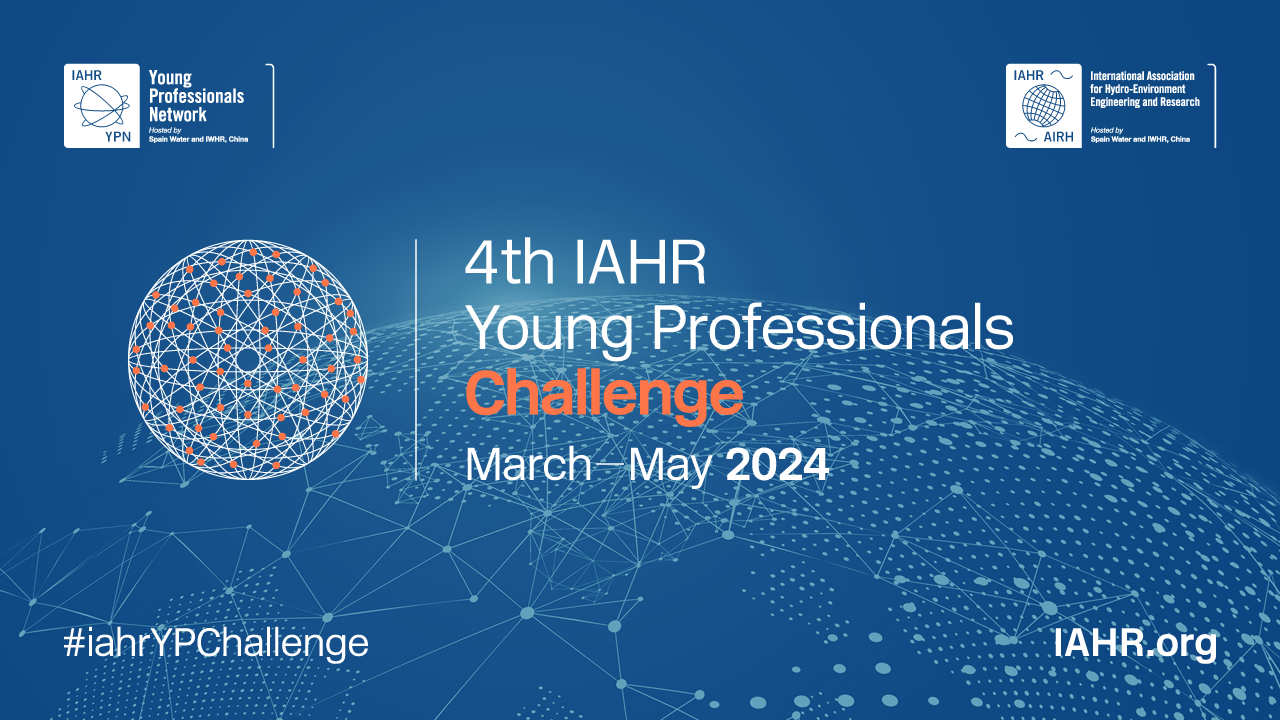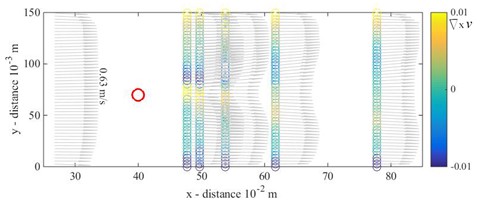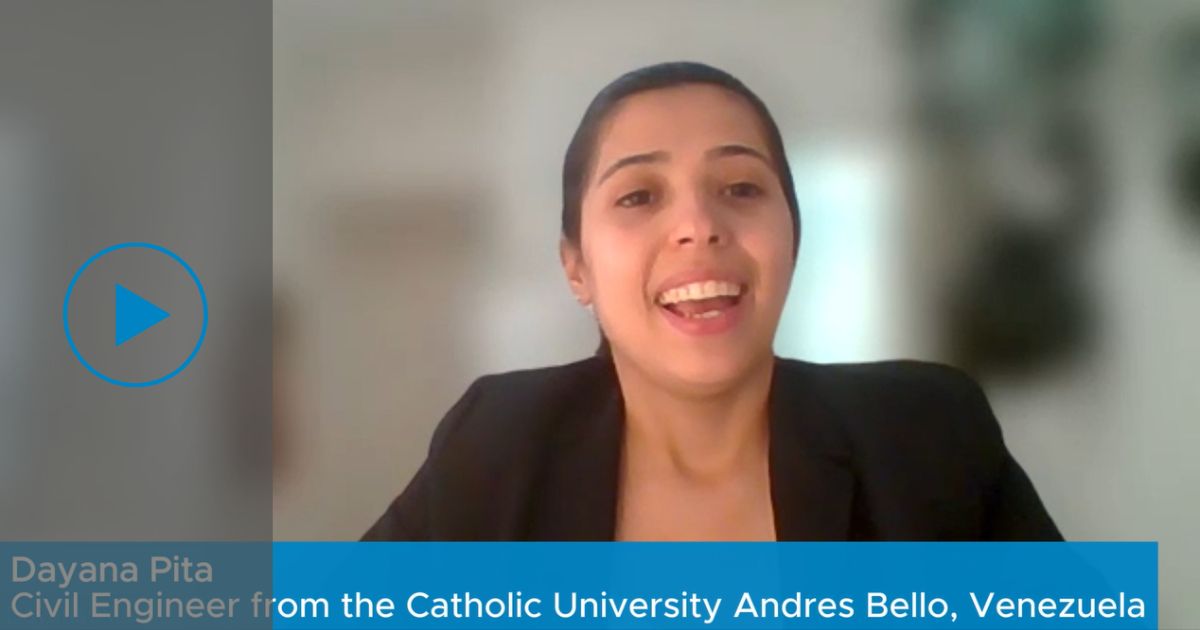4th IAHR Young Professionals Hydro-Environment Challenge

Participants Finalists Previous editions Keep me updated
Sponsored by:
After three successful editions, in 2024 the IAHR Committee on Education and Professional Development will run the 4th edition of the Young Professionals Hydro-Environment Challenge, which seeks to promote international and interdisciplinary collaboration among young professionals and academics working at institutions across the globe in the hydro-environment field. The first three editions of the project brought together around 200 participants. This event attracts practitioners and academics fostering in both streams future leaders in the hydro-environment field.
The Young Professionals Hydro-Environment Challenge is an open contest, so any kind of young professional profile working on any of the IAHR main themes is welcome to take part in this online initiative. Many representative case studies aligned with IAHR themes are assigned to the participating teams who, after a period of web-based collaborative engineering work, present their project outcomes during an IAHR webinar. Several project stakeholders, including universities, companies, and public authorities are involved in the design and mentoring of the case studies. A jury made up of senior IAHR members and representatives from industry partners evaluates the teams.
The next edition will take place between March and May 2024, for a total workload of around 50 hours over 10 weeks. During this time the participants will interact with their fellow participants as well as with IAHR coaches and technical mentors, aiming to solve two technical challenges, focusing on water resources and experimental data. The best groups will have the opportunity to be recognized for their accomplishment and receive an award during the 41st IAHR World Congress in Singapore, in June 2025.
The Education and Professional Development committee of IAHR is looking for institute partners to support the Young Professionals Hydro-Environment Challenge. There are three means whereby your institution, as an IAHR institute member, can contribute to the initiative:
Dissemination of the event throughout your institution and engagement of participants. We are now looking for participants, who should all be ≤35 years. No specific background is needed as long as the participants are working in the hydro-environment field. If you would like to recommend any of your staff members or students, please submit his/her data through the following form.
Sponsoring the event. This is an opportunity for your institution to gain visibility by providing economic support to the event. This support will address the event’s sustainability, and will also provide an award to the best team. Please contact the IAHR Secretariat (elsa.incio@iahr.org), for more information about sponsoring packages.
Bring your own case study. Future editions are currently being prepared. If your institute would like to actively contribute to this initiative by proposing case studies and topics, please get in contact with the organisers (Michael Nones, mnones@igf.edu.pl).
The challenge is reserved for young professionals (≤35 years). Please note that no training on the software will be directly provided as part of the challenge, but proper references will be given to allow participants to develop basic skills and to be able to complete the challenge.
Concept
International and interdisciplinary web-based collaboration.
Open contest, any kind of young professional profile working on any of the IAHR main themes is welcome to join the initiative.
Engineering challenges, case studies aligned with IAHR themes.
Universities and stakeholders are involved in setting up the case studies and providing mentoring to the students.
Winners will receive a free copy of an e-book from CRC Press / Balkema by Taylor & Francis Group.
Project outcomes will be presented during the 41st IAHR World Congress.
Participation is free.
Certificates of attendance will be issued upon request.
Members: Free
Non members: 25 euro or 12 euro (depending on the income country level) which is equivalent to a membership fee so a one-year free membership fee will be included.
General learning objectives
Upon completion of the challenge, each participant will be able to:
Analyse complex hydro-environmental problems for collaborative engineering.
Use web-based tools.
Defend his or her input on an interdisciplinary team of specialists.
Assess his/her own strengths and weaknesses with respect to working in a group.
Defend the groups' findings in front of a team of experts in the field.
Workload and implementation
Total hour load: 50 hours
Workload: 5 hours/week
Total duration: 10 weeks
Mentoring: two mentors per case-study, for technical support and coaching
Mode: online
Testimonies from previous editions
"Through this project, we've not only expanded our network of contacts but also gained insights into diverse knowledge areas and work styles, learning how to effectively combine them for collaborative success. Apart from that, it has also allowed us to get to know other cultures. Unexpected anecdotes, such as navigating through confusion during the springtime change, accommodating the working hours of a team member during Ramadan, or concluding meetings with off-topic discussions, have enriched our experience in the Challenge. Communication and teamwork skills, particularly in an international context, are often overlooked in academic institutions. However, these qualities are increasingly essential and somewhat scarce among younger members of international associations like the IAHR".
Gonzalo García-Alén Lores - 3rd Edition Winner
Engineering Challenges
Water Resources Challenge
General description: There is an existing mine site which stopped operations and needs to be closed. For many years, the ore was extracted from an open pit, then processed to extract the targeted minerals, and finally, the waste material (in the form of a solid-liquid mixture called slurry) was disposed in a so-called “tailings storage facility” (TSF). Both the TSF and the open pit have accumulated a significant amount of water. All that water is considered to be “contacted” and cannot be released to the environment. It needs to be treated first. The site has a wet season and a dry season every year. All the rainwater that reaches the TSF and the open pit, becoming contacted water.
The plan is to treat all the contacted water, release it to the environment, and bury the land which still has some undesired minerals in it (considered polluted soils) using clean soils. This process is called “dry capping”. This implies burying the TSF and filling the open pit, generating this way new landforms that will not generate pollution through infiltration, surface runoff, or dust.
Learning goals:
determine how many treatment plants are required to close the mine site in 5 years, at the most. Each treatment plant implies a considerable investment and operational costs
since the nature of rainfall is random, the answer needs to be linked to a certain probability of success, via random realizations (Monte-Carlo approach), where the random variable is the daily rainfall
consideration of climate change trends
Technical Mentor: José Adriasola (Bechtel Corporation, Chile)
1st Coach: Michael Nones (Institute of Geophysics. Polish Academy of Sciences, Poland)
Experimental Data Challenge
General description: General description: Explore a laboratory database acquired with an Ultrasound Velocity Profiler (UVP) in the wake of a cylinder. UVP is a well-consolidated ultrasound measurement technique employed in a large range of environmental and industrial applications ensuring flow velocity profiling where optical access is not possible and in turbid fluids (e.g., river flow). The objective is to carry out an analysis of the mean velocity field and its deviations over time around a simple obstacle to the flow (i.e. a cylinder) based on an existing UVP database.
Learning goals:
Get familiar with the general principles of ultrasound techniques and specifically the UVP
Explore a laboratory database acquired with UVP
Learn some basic features about cylinder drag and downstream wake vorticity
Organisations involved: IAHR Technical Committee on Experimental Methods and Instrumentation
Technical mentors: Massimo Guerrero (University of Bologna, Italy); Margaret Chen (Vrije Universiteit Brussel, Belgium); Ana Margarida da Costa Ricardo (Instituto Superior Técnico Lisbon, Portugal); Marie Burckbuchler (Ubertone, France)
1st coach: Michael Nones (Institute of Geophysics PAS, Poland)

Organising committee
Chair: Michael Nones. Institute of Geophysics. Polish Academy of Sciences. Poland
David Ferras. IHE Delft. The Netherlands
Eva Fenrich. University of Stuttgart. Germany
José M. Carrillo. Universidad Politécnica de Cartagena. Spain
Margaret Chen. Vrije Universiteit Brussel. Belgium.
José M. Adriasola V. Bechtel Corporation. Chile.
Key dates
Call for applications opens: 1 January 2024
Deadline for applications: 18 February 2024
Project start: March 2024.
Kick-off meetings
Water Resources Challenge: 4 March 2024 | 14:00-15:30 CET
Experimental Data Challenge: 6 March 2024 | 13:00-14:30 CET
Mid-term meetings
Experimental Data Challenge: 15 April 2024 | 14:00-15:00 CEST
Water Resources Challenge: 17 April 2024 | 15:00-16:00 CEST
Report submission: 31 May 2024
Final defence
Water Resources Challenge: 18 June 2024 | 13:30-15:00 CEST
Experimental Data Challenge: 17 June 2024 | 9:30-10:30 CEST
Displaying your logo and linked company name on the event webpage
Displaying your logo and linked company name on the promotional emails
Displaying your logo and linked company name in social media campaigns
Displaying your logo on the certificate of participation and attendance
Verbal recognition by the organising committee at the opening & closing of the challenge public defenses
A 2-minute exhibit (video) to promote/introduce your products or services can be arranged during the break of the defenses
1-year FREE Institute membership (for non-members)
1800 euros for non IAHR Members (institute large >450 employees)
1200 eurosfor non IAHR Members (institute small <450 employees)
500 euros for IAHR Institute Members
Become a sponsor!
Advertising and sponsorship opportunities at IAHR Young Professionals Challenge
Sponsoring IAHR YP Challenges and being featured on the Challenge online platforms is a cost-effective way to advertise to our membership base and reach the next generation of hydro-environment professionals and leaders while attracting and retaining young talent in your community.
As our young professional’s membership grows, and the need for a greater diversity of professional development and networking opportunities arise, your sponsorship will ensure that our members continue to receive quality opportunities for growth as young professionals.
As a sponsor of the 3rd IAHR Young Professionals Challenge, you will enjoy a high level of visibility on a variety of IAHR platforms and channels of promotion, including:
Minimum sponsorship amount:
» Access IAHR Institute Members Directory
We’ll be happy to cater your support to the needs of your organisation/company. Please contact iahr@iahr.org
Sponsored by:
